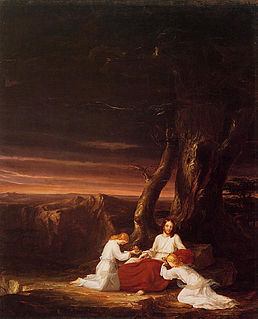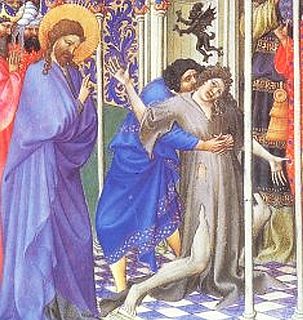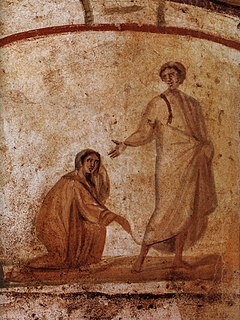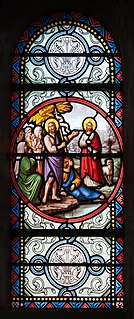
Matthew 1:21 is the twenty-first verse of the first chapter in the Gospel of Matthew in the New Testament. Joseph is being spoken to in a dream by an angel. In this verse, the angel tells Joseph to call the child "Jesus", "because he will save his people from their sins".

Matthew 4:11 is the eleventh verse of the fourth chapter of the Gospel of Matthew in the New Testament. Jesus has just rebuffed Satan's third temptation and ordered him away. In this last verse of the temptation scene the devil departs and Jesus is serviced by angels.

Mark 5 is the fifth chapter of the Gospel of Mark in the New Testament of the Christian Bible. Taken with the calming of the sea in Mark 4:35–41, there are "four striking works [which] follow each other without a break": an exorcism, a healing, and the raising of Jairus' daughter.

Matthew 8:2 is the second verse of the eighth chapter of the Gospel of Matthew in the New Testament. This verse begins the miracle story of Jesus cleansing a leper, the first of a series of miracles in Matthew.

Matthew 8:3 is the third verse of the eighth chapter of the Gospel of Matthew in the New Testament. This verse continues the miracle story of Jesus cleansing a leper, the first of a series of miracles in Matthew.

Matthew 10:1 is the first verse of the tenth chapter of the Gospel of Matthew in the New Testament. In this verse Jesus gathers his disciples and grants them healing powers in what is known as the commissioning the twelve apostles.
Matthew 9:22 is a verse in the ninth chapter of the Gospel of Matthew in the New Testament.

Matthew 9:18 is the 18th verse in the ninth chapter of the Gospel of Matthew in the New Testament.

Matthew 8:15 is the fifteenth verse in the eighth chapter of the Gospel of Matthew in the New Testament which relates the Healing the mother of Peter's wife.

Matthew 15:22 is a verse in the fifteenth chapter of the Gospel of Matthew in the New Testament.

Matthew 15:27 is a verse in the fifteenth chapter of the Gospel of Matthew in the New Testament.
Christianity and fringed garments refers to the mention of fringed garments in Christian sources, and to their use in Christian ritual, and to the possible connection to Jewish tzitzit and tallit.

In English translations of the Bible, unclean spirit is a common rendering of Greek pneuma akatharton, which in its single occurrence in the Septuagint translates Hebrew ruaḥ tum'ah.

Jesus' interactions with women are an important element in the theological debate about Christianity and women. Women are prominent in the story of Christ Jesus. He was born of a woman, had numerous interactions with women, and was seen first by women after his resurrection. He commissioned the women to go and tell his disciples that he is risen, which is the essential message of Christianity.

The healing of the mother of Peter's wife is one of the miracles of Jesus in the Gospels, reported in Matthew 8:14–15, Mark 1:29–31, and Luke 4:38–39.

Jesus healing the bleeding woman is one of the miracles of Jesus recorded in the synoptic gospels.

John 1:29 is the twenty-ninth verse in the first chapter of the Gospel of John in the New Testament of the Christian Bible.
"(I Know) His Blood Can Make Me Whole" is a traditional gospel blues song recorded by Blind Willie Johnson in 1927, and released on his first single, with the flip side "Jesus Make Up My Dying Bed". The song is sometimes called "Jesus' Blood Can Make Me Whole", "(I Know) His Blood Has Made Me Whole", etc. Barbecue Bob recorded the former title earlier in 1927.
Matthew 12:43-45 is a set of verses in the twelfth chapter of the Gospel of Matthew in the New Testament.
Matthew 12:49-50 is a set of verses in the twelfth chapter of the Gospel of Matthew in the New Testament.














